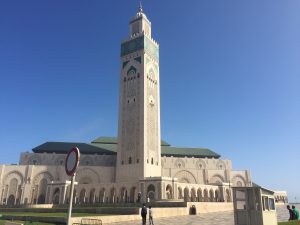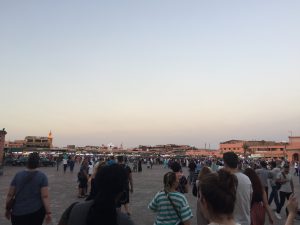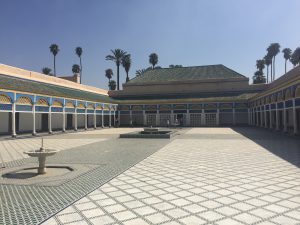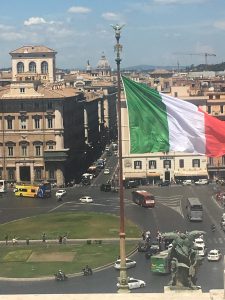
Paris—
Paris was on my ‘must-see’ list when abroad. After looking at all of my weekends and planning out which cities I would travel to and when, Paris landed on the shortest weekend, 3 days: two for travel, and one for sight-seeing. It seemed like a stretch, but there’s a reason why it’s called a ‘can’t-miss’ list. I booked my train ticket with a friend, and the two of us headed out to conquer Paris in a day. We arrived the Friday evening to a very busy train station. We were heavily warned about thieves and bag-slicers, so we held our bags close as we wandered through the station. We had done some previous research about metro passes (something everyone should do if you are looking to get around a city easily), and were able to find the machine to get them. Stepping out in to the street, well, it is not the Paris we expected. Wave after wave of stench hit our noses as we navigated to our Airbnb. We were a little shaken at the shock of what we thought Paris was going to be like vs. our first impressions. However, we dusted ourselves off, threw on some deodorant, and took a train to see the Eiffel Tower light up at 10pm. We found a shop that made cheesy baguettes stuffed with hot dogs, took them to-go, and found a nice spot on the lawn in front of the Tower. There, we had a nice time seeing the sun go down, the Tower light up, and the lights being to sparkle. It was quite a sight. The next day, we utilized the train and bus system to hit the Palace of Versailles, The Arc de Triomphe, Moulin Rouge, the outside of The Louvre, the Notre Dame, and a second visit to the Eiffel Tower. We walked from the Moulin Rouge to The Louvre, which totaled about 45 minutes. It was there that we got to see what we thought Paris ‘really’ looked like: triangular stone buildings and terraces with flowers growing out of them. It was beautiful. We realized that movies would only show the historical parts of Paris, not the modernized ones. By the end of the day, we were exhausted from the amount of traveling we did in a single day. Our wallets, however, were not. A cavet of t-tickets, meaning 10 travel passes on either the subways or buses, cost a mere 14 euros. The banana and Nutella crepes we had cost 5 euros. That was about the extent of our expenses, excluding the Airbnb. It is very easy to do Paris in a day, on a budget. I recommend visiting Paris at least once in your life, but it is not a city I would want to spend more than 2 or 3 days in, simply because it feels just a bit too large.
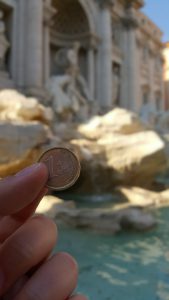
Rome—
I have visited Rome once before in high school, and knew I would be back again some day. The high school tour, however, was a bus tour, and all of our meals were set up and paid for. Traveling abroad with a friend is much different. We decided to see both Rome and Venice in a single 4 day weekend. Rome is a 13 hour train ride from our city in Austria, and only 7 hours from Venice. We found the perfect overnight train that would take us from Austria to Rome, and arrive at about 10am. A teacher on the program advised us that the two-tiered bus tours of the city are definitely worth the money if you can haggle it to a decent price. We arrived at the Roma Termini, one of Europe’s largest train stations, after a long night of barely sleeping on the train. After purchasing a metro pass to get from the main city to our Airbnb, we were approached by a man attempting to sell us passes for the Roma Big Bus City Tour. I was hesitating because I wanted to drop our stuff off at the Airbnb before touring Rome, but he lowered the price to only 20 euros, so it was impossible to refuse. We saw all of the ancient sights in a matter of an hour, and got off at St. Peter’s Basilica and did some souvenir shopping. With your student ID, you can get into the Sistine Chapel Museum for only 8 euro (so make sure to bring that cardinal card abroad!). Later, we got back on the bus and cruised around Rome some more. We made sure to stop at the Trevi Fountain to throw another coin into the water so that we will come back in the future. Ended the day with some more gelato and fresh grapes. The next day, we ran into some issues with the public transportation system…a ‘strike’ kind of issue. We decided we would just suck it up and walk the hour and a half to the train station rather than paying for a taxi. We got to see a different, non-touristy side to Rome so that was pretty cool. With the help of the train station staff, we were able to find our train to Venice with only 5 minutes to spare. Talk about a crazy way to end our time in Rome! Final thoughts: I love Rome with all of my heart and would love to live there some day. The history intermingled with daily life is truly unique, and if you get the chance to travel, Rome is a MUST.

Venice—
The issues with the strikes in Rome carried its way to Venice, because we struggled to find a way to our Airbnb from the train station, and we weren’t wanting to walk 2 hours to it. Eventually we gave in and found a taxi to take us. We were too tired to head back into the main city at 8pm, so we stayed nestled in our Airbnb and got some much needed sleep. In the morning, we found our way to the bus and got a ticket to the main islands. There, we just wandered Venice all day. This city isn’t one you typically learn about in history class, so we weren’t pressed to visit any main monuments or structures. Instead, we took pictures in the alleyways, crossed over bridges, and waved to the gondolas as they passed by. It was a very relaxing day, up until we made the mistake of passing through San Marco’s Square, where there seemed to be thousands of tourists packed into the small alleys. Once we got out of there, we grabbed some pasta at a restaurant along the river and enjoyed the last minutes of daylight in Venice. It was absolutely beautiful, and contrary to rumors, it did not smell in the slightest. Venice is an incredible city, and one that I would love to revisit someday.
Mandy Paganetto, ’17
B.S. in Marketing and Sport Administration
